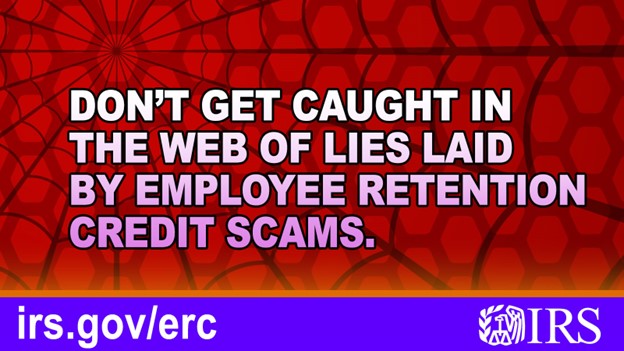
As recently as May 25, 2023, the IRS has been issuing warnings to taxpayers to beware of the Employee Retention Credit (ERC). The latest press release includes the clarification that “The Employee Retention Credit (ERC), also sometimes called the Employee Retention Tax Credit or ERTC, is a legitimate tax credit. Many businesses legitimately apply for the pandemic-era credit,” but goes on to lay out the various ways in which “aggressive promoters are wildly misrepresenting and exaggerating who can qualify for the credits.” The IRS has increasingly labeled some ERC claims as fraud. Again, in the May 25 press release: “This is an ongoing priority area in many ways, and the IRS continues to increase compliance work involving ERC. The IRS has trained auditors examining ERC claims posing the greatest risk, and the IRS Criminal Investigation division is working to identify fraud and promoters of fraudulent claims.”
Examples of the IRS’s evolving warnings about ERC fraud:
October 19, 2022: “The Internal Revenue Service today warned employers to be wary of third parties who are advising them to claim the Employee Retention Credit (ERC) when they may not qualify. Some third parties are taking improper positions related to taxpayer eligibility for and computation of the credit.”
March 7, 2023: “The IRS and tax professionals continue to see third parties aggressively promoting these ERC schemes on radio and online…. Businesses should be cautious of advertised schemes and direct solicitations promising tax savings that are too good to be true.”
March 20, 2023: “The IRS is stepping up enforcement action involving these ERC claims, and people considering filing for these claims – only valid during the pandemic for a limited group of businesses – should be aware they are ultimately responsible for the accuracy of the information on their tax return. The IRS Small Business/Self-Employed division has trained auditors examining these types of claims, and the IRS Criminal Investigation Division is on the lookout for promoters of fraudulent claims for credits.”
April 26, 2023: “Taxpayers should be aware of aggressive pitches from scammers who promote large refunds related to the Employee Retention Credit. With ads all over the internet, social media and radio, fraudulent promoters try to con ineligible people to claim the credit. These promotions have false information about who’s eligible and how the IRS calculates the credit.”
IRS Commissioner Daniel Werfel, in Congressional testimony on April 27, 2023: “The employee retention credit has two particular challenges. Probably more, but I will highlight two of them. One is that it turns out to be an extremely difficult credit to process because it impacts multiple tax years, so the individual at the IRS that has to process it has to make sure they get the information right in each of the right tax years. That takes time, it takes expertise. And in order for the credit to register, we have to get it right. The second is it’s a problem with the number of fraudulent credits we’re getting in. So, we’re having to set aside credits that just don’t seem to add up, and it’s clogging the system a bit.”
On Twitter:

The IRS has been expressing concern over the Employee Retention Tax Credit and has even gone so far as to claim that significant fraud is occurring among those filing for the credit. A recent Bloomberg Tax article calls ERC a “Fraud-Laden Pandemic Credit,” and reports, “The IRS confirmed to Bloomberg Tax a recent report stating that the agency has opened 122 investigations totaling $1.2 billion in credit claims as of April 30.”
However, in a recent Wall Street Journal article with the subtitle, “The IRS is struggling to process hundreds of thousands of claims for the employee-retention tax credit amid worries about fraud,” Douglas O’Donnell, the IRS deputy commissioner for services and enforcement, is quoted as saying, “Most employee-retention credit claims are legitimate.” He also said about some refund requests, “It’s along the spectrum of very aggressive to fraudulent.”
What is the ERC Fraud Spectrum?
On one extreme is actual fraud in which an individual fabricates a false entity, employees, payroll, and tax returns to steal funds from the Treasury. There have been numerous prosecutions of schemes like this related to PPP loans, but very few, so far, related to ERC. Most of what the IRS warns against, however, falls short of this level of brazen theft. The IRS repeatedly warns against “aggressive pitches” by promoters of the credit. Such promoters are advertising their services to real employers with real employees. Apparently, some are interpreting the statute and IRS guidance in an overly aggressive manner. Aggressive interpretations may not necessarily be intentionally false, which would cross the line into fraud. Even within an aggressive and erroneous claim, there may be limited parts of that claim that are legitimate.
The ERC is an unprecedented program. The parameters and rules of the program were changed midstream by Congress multiple times. IRS produced dozens of “frequently asked questions,” some of which were challenged by Congress and modified. The statutory rules and subsequent guidance are widely acknowledged to be complex and, in some areas, subjective. It’s inevitable that there will be instances where taxpayers and the IRS reach different conclusions about specific facts and circumstances. But good faith attempts to reach accurate conclusions about which the IRS disagrees is not fraud.